In the United States, the presidential election is a long, drawn out process. For over a year, over two dozen Democratic hopefuls have campaigned across the country, trying to win votes, media attention, and fundraising dollars. Candidates must first beat out their fellow Democrats in a four-month process called the primaries, in order to face off against President Trump in the general elections in November.
Following a decades-old tradition, the first state to participate in the process is Iowa. When Iowans gathered in school gymnasiums and community centers on February third, Senator Bernie Sanders and Mayor Pete Buttigieg came out as clear front-runners.
Sanders won big again on Tuesday night in the New Hampshire primary, with Pete Buttigieg coming in a close second. These early wins give Sanders and Buttigieg a strong start in the race to the White House.



